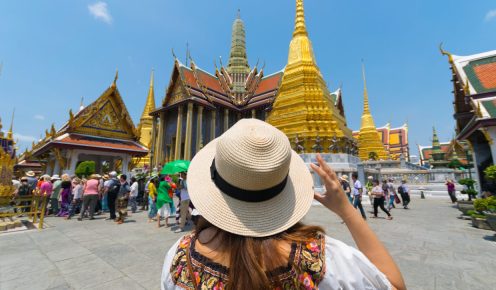Just after saying goodbye to a group of teachers from Thailand visiting institutions in Beijing, tour guide Yang Yaoyu rushed to Shanxi Province in northern China to see another group of Thai tourists.
The seasoned Thai-speaking tour guide can confirm to a recent rise in enthusiasm among Thai tourists towards China, following the implementation of a mutual visa exemption agreement between the two nations on March 1.
“Previously, the peak of Thai travelers to China was in April, following the Songkran celebration. However, my itinerary is now fully packed from March 3 to the end of April,” Yang explained.
Porntip Rojansunan, along with the other 20 Thai guests in her group, will benefit from the visa waiver. On March 9, the group flew immediately from Bangkok to Taiyuan, the capital of Shanxi, and began their five-day vacation by seeing three UNESCO World Heritage sites in the province: Mount Wutai, Yungang Grottoes, and the old city of Pingyao.
“Before, I was only familiar with Chinese cities like Beijing and Shanghai. I must say that the profound history and rich culture of Shanxi have captivated me since my arrival. Porntip stated, “I will undoubtedly encourage my friends and relatives to visit Shanxi and experience its charm for themselves.”
The visa-free policy has encouraged cultural contacts between Chinese and Thai people, and an increasing number of Thai tourists are viewing China as their first choice destination for international travel.
According to data from China’s largest online travel agency Trip.com, the number of Chinese tourists visiting Thailand increased by more than 30% year on year on March 1, while travel orders from Thailand to China increased threefold year on year, an increase of more than 160 percent over 2019.
China and Thailand are key tourist destinations and sources for each other, and the implementation of the mutual visa exemption will have a large positive impact on the expansion of both countries’ tourism industries, according to Qin Jing, vice president of Trip.com Group. According to Qin, the Chinese side may offer more personalized options for Thai tourists in areas such as culture, folk customs, and snow-and-ice sports.
China remains committed to facilitating entry for foreign nationals, with the goal of becoming a favored destination for international travelers. Since the mutual visa exemption policy between China and Thailand went into effect, the number of countries with such policies with China has grown to 23, including Singapore, the Maldives, and the United Arab Emirates.
In addition, China has implemented a visa-free policy for Switzerland, Ireland, Hungary, Austria, Belgium, and Luxembourg on a trial basis beginning March 14. According to industry insiders, this sequence of steps is a favorable signal that will help to promote the global economy and trade while also increasing personnel interchange.
“The recently finished sessions of China’s top legislative and top political advisory body, often known as the ‘two sessions,’ stated that the country will make it easier for foreign people to work, study, and travel within China. This demonstrates that the basics of China’s unshakeable commitment to opening up remain unchanged,” said Zhang Wei, secretary general of the China Association of Travel Services’ inbound tourist division.
Source: Xinhua News












